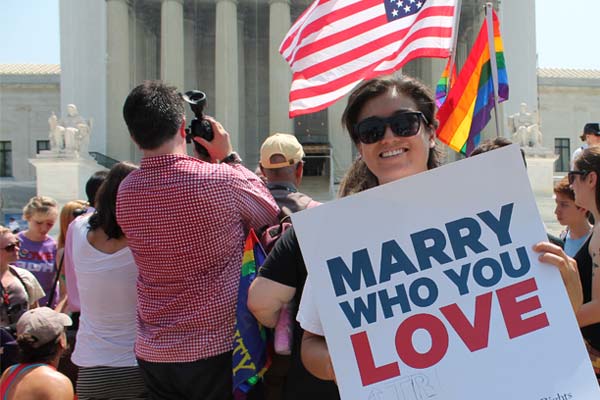
Why the U.S. Supreme Court was bound to legalize same-sex marriage: U of T expert analysis
Published: June 26, 2015
In an historic victory for equal rights, the U.S. Supreme Court ruled 5-4 in favour of legalizing same-sex marriage in all 50 states: the constitutionally awarded right to marry will no longer be reserved for heterosexual couples in America.
“Under the Constitution, same-sex couples seek in marriage the same legal treatment as opposite-sex couples, and it would disparage their choices and diminish their personhood to deny them this right,” wrote Supreme Court Justice Anthony Kennedy in support of the ruling.
President Barack Obama hailed it as a victory for America in a statement read from the White House rose garden. “This decision affirms what millions of Americans already believe in their hearts,” said Obama. “When all Americans are truly treated as equal, we are more free.”
U of T News spoke about the Supreme Court’s decision with lawyer Kyle Kirkup, a U of T Doctor of Juridical Science 2016 candidate and former Trudeau Scholar.
Kirkup recently partnered with U of T Law professor Brenda Cossman, director of U of T's Bonham Centre for Sexual Diversity Studies and legal authority on same-sex marriage issues, to co-author a Globe and Mail article predicting the legalization of same-sex marriage this summer.
What’s the significance of the U.S. Supreme Court’s decision to legalize gay marriage?
Today's decision has profound implications. All 50 states of the union are now required to recognize same-sex marriage under the U.S. Constitution. Writing about gay and lesbian couples, Justice Kennedy wrote: "They ask for equal dignity in the eyes of the law. The Constitution grants them that right." In concrete terms, the decision means that couples like April DeBoer and Jayne Rowse, one of the plaintiffs in the case, will finally be recognized as the legal parents to their four adoptive children.
Does this decision come as a surprise, especially from this Supreme Court?
When the U.S. Supreme Court heard oral arguments in the case in April 2015, Professor Brenda Cossman and I wrote in The Globe and Mail that today's outcome was inevitable. No longer in a position to make legal arguments about the inherent sin of homosexuality, opponents of same-sex marriage were left to argue that including gays and lesbians would radically alter the institution. Heterosexuals, they argued, would no longer be interested in marriage if the right was also extended to same-sex couples.
The problem with this legal argument, however, is that there is virtually no empirical evidence to support it. While marriage rates have been declining across the board for years, countries that have legalized same-sex marriage, such as Canada, have seen no greater declines than countries that have upheld traditional definitions of marriage.
What is surprising, however, is to see Chief Justice Roberts issuing such a strongly-worded dissent opposing the court's decision. Many predicted that he would sign on to the majority opinion.
How does will the ruling impact states like Kansas, Montana and South Carolina?
The U.S. Supreme Court has made it clear that same-sex marriage is protected under the Fourteenth Amendment of the U.S. Constitution. All states will be required to follow today's decision, and organizations such as the American Civil Liberties Association (ACLU) will be on standby to ensure that there are no problems when gay and lesbian couples start requesting marriage licences in states like Kansas, Montana and South Carolina.



